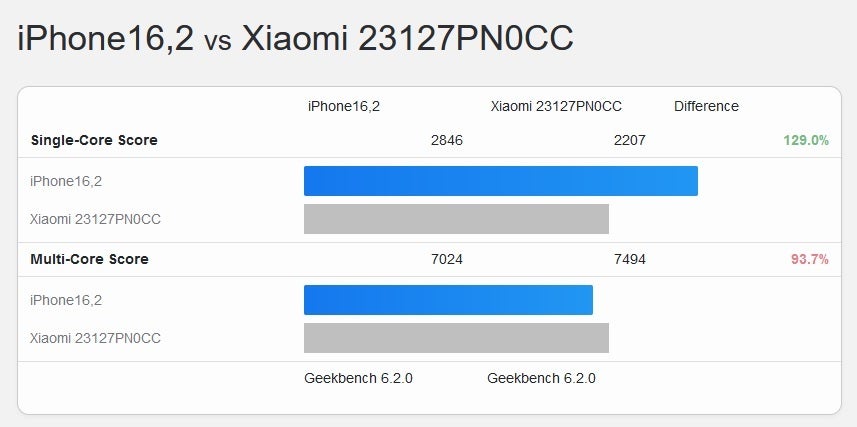Snapdragon 8 Gen 3 goes against A17 Pro on Geekbench; which chip is the winner?

Whether you hang on the results of every benchmark test or ignore them for not showing rear-world results, Geekbench, Antutu, 3DMark, and others do exist because they help manufacturers and phone enthusiasts get an objective score on intangibles that really can't be measured in other ways. Of course, over the years there have been phone manufacturers that gamed the system such as Samsung with the Galaxy Note 3 in 2013 and HTC the following year.
Speaking of benchmark testing, two SoCs that will be discussed over the next six months, the 4nm Qualcomm Snapdragon 8 Gen 3 chipset and the 3nm Apple A17 Pro recently went mano a mano on Geekbench. The former is expected to power most flagship Android phones next year (including the Galaxy S24 Ultra) and should be officially unveiled by Qualcomm within days. The latter is the only 3nm smartphone chip in use as it powers the iPhone 15 Pro and iPhone 15 Pro Max.
In this benchmark battle, the Snapdragon 8 Gen 3 surpassed the Apple A17 Pro in the multi-core section of the test by a score of 7494 to 7288. The A17 Pro did outscore the Snapdragon 8 Gen 3 in the single-core test by a score of 2846 to 2207. The phone used to test the Snapdragon 8 Gen 3 appears to be the unreleased Xiaomi 14 with 16GB of RAM while the iPhone 15 Pro Max was tested to get the score for the A17 Pro.
Helping the Snapdragon 8 Gen 3 perform strongly is its 1+3+2+2 configuration which includes one prime CPU core running at 3.30GHz, three performance CPU cores running at 3.15GHz, two more performance CPU cores clocked at 2.96GHz, and two efficiency CPU cores running at 2.27GHz. The A17 Pro sports six CPU cores with two performance cores and four efficiency cores. The P-cores run at 3.78GHz while the E-cores run at 2.11GHz.

The Geekbench battle between the A17 Pro and the Snapdragon 8 Gen 3
In theory, it is something of a surprise that the Snapdragon 8 Gen 3 was able to top the A17 Pro considering that the latter was manufactured by TSMC using its N3B 3nm process node. The Snapdragon 8 Gen 3 was also built by TSMC but with its 4nm node. With the smaller transistors used in the 3nm process, the 19 billion transistors in the A17 Pro should outnumber the number found in the Snapdragon 8 Gen 3. And that should make the A17 Pro more powerful and/or energy-efficient than its rival.
But there are other factors that determine a Geekbench score including how hot a particular device gets. It's possible that other Android phones using the Snapdragon 8 Gen 3 chipset score higher or lower depending on the other factors including how well they can dissipate heat.
Follow us on Google News













Things that are NOT allowed:
To help keep our community safe and free from spam, we apply temporary limits to newly created accounts: